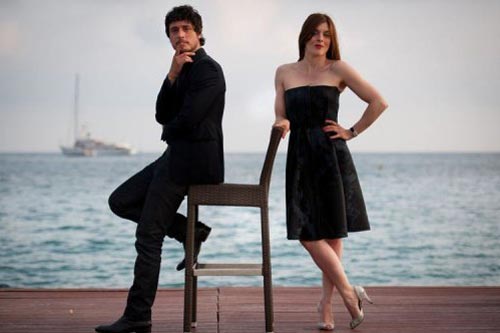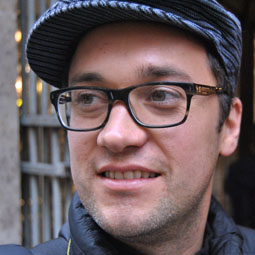Declaration of… Love
I liked it and I’m not alone. Audiences and critics here have hailed “Declaration of War” (La guerre est declarée), a film by French director Valérie Donzelli, now in its fifth successful week in theaters. France likes it so much that it has made the movie the country’s official submission to the Oscars. The Academy Awards nod is sure to give it play outside France’s borders.
The plot is simple and terrifying: Young, hip couple fall in love and make a baby. Couple discovers baby has a brain tumor. Couple spends the rest of the movie doing their best to save the baby and themselves.
The story is based on the real life experience of director Donzelli (pictured right), who co-wrote the screenplay with partner Jérémie Elkaïm (left). And here’s the real kicker: They both play themselves in the movie, reliving probably the hardest moments of their life.

I found myself immediately wrapped up in the film - perhaps because I’m a young father - but also against my better instincts. This movie has all the trappings of the artsy-smartsy stink Paris filmmakers push out into the world with unfortunate frequency. The opening scene is of a pair of legs walking, endlessly it seems, down a hospital corridor. There’s a ton of hand-held camera shots.
I left the theatre happy, buoyant even, and also very conflicted about my own notions about French cinema. I called friend and movie critic Jon Frosch for answers and counsel. Our conversation went something like this:
Me: I don’t get it, why did I like this movie?
Jon (wondering if he heard the question right): Maybe because the story has a universal appeal, it’s about a situation that would be frightening to any person. French movies often focus on emotions or preoccupations that may come off as very French. The characters agonize and talk and talk and talk over emotional problems in a way that's not easy to understand or appreciate for American audiences, and their approach to dealing with them is much more tortured, ambiguous, and philosophical than we're used to. Americans tend to like their movies punchier and more morally clear-cut. This movie deals with a universal problem and shows people confronting it bravely and head-on.
Me: What about the extra avant-garde stuff? The musical duet, the part when everyone starts kissing? Usually that makes me unplug immediately.
Jon (now reaching for his arsenal of movie critic verbiage): The filmmakers used a fresh, dynamic style to enliven and renew an old genre (the disease movie). It’s a movie about disease, but not at all like other movies of people getting sick, not heavy and overly tear-jerking. It's paced like a thriller and has a light, often comic tone. It’s not even so much about the sick baby. You don’t even see him the second half of the movie. It’s more of a portrait of a young, 21st century couple and how they deal with something potentially tragic. You probably liked it because you are not into the languorous, ambiguous, talky French films. Here the characters are always running.
Me (feeling reassured): So did you like it?
Jon: I thought it was an interesting, bold stylistic approach, and the first half is gripping, but on the whole I found it overrated. The couple was annoyingly perfect, and their characters and relationship left me cold, despite their heartbreaking situation.
Me (indignantly): How can you say that about the best French movie ever!
Jon: You really do need help.




2 Comments
Post new comment